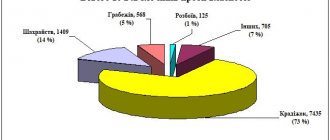Criminal Procedure Code of the Russian Federation, Article 213 of the Code of Criminal Procedure of the Russian Federation
1. A criminal case is terminated by a decision of the investigator, a copy of which is sent to the prosecutor, except for the cases provided for in Article 25.1 of this Code.
2. The resolution specifies:
- 1) date and place of its issuance;
- 2) position, surname, initials of the person who issued it;
- 3) the circumstances that served as the reason and basis for initiating a criminal case;
- 4) paragraph, part, article of the Criminal Code of the Russian Federation, providing for the crime on the basis of which a criminal case was initiated;
- 5) the results of the preliminary investigation indicating information about the persons against whom criminal prosecution was carried out;
- 6) the preventive measures used;
- 7) paragraph, part, article of this Code, on the basis of which the criminal case and (or) criminal prosecution are terminated;
 a decision to cancel the preventive measure, as well as the seizure of property, correspondence, temporary removal from office, control and recording of negotiations;
a decision to cancel the preventive measure, as well as the seizure of property, correspondence, temporary removal from office, control and recording of negotiations;- 9) decision on material evidence;
- 10) the procedure for appealing this decision.
3. In cases where, in accordance with this Code, termination of a criminal case is allowed only with the consent of the accused or victim, the presence of such consent is reflected in the resolution.
4. The investigator shall hand over or send a copy of the resolution to terminate the criminal case to the person against whom the criminal prosecution has been terminated, the victim, the civil plaintiff and the civil defendant. In this case, the victim, the civil plaintiff, is explained the right to bring a claim in civil proceedings if the criminal case is terminated on the grounds provided for in paragraphs 2 - 6 of the first part of Article 24, Article 25, paragraphs 2 - 6 of the first part of Article 27 and Article 28 of this Code.
In criminal cases of crimes provided for in Articles 198 - 199.1 of the Criminal Code of the Russian Federation, the investigator sends a copy of the resolution to terminate the criminal case to the tax authority, which, in accordance with paragraph 3 of Article 32 of the Tax Code of the Russian Federation, sent materials for making a decision on initiating a criminal case.
5. If the grounds for termination of criminal prosecution do not apply to all suspects or accused in a criminal case, then the investigator, in accordance with Article 27 of this Code, makes a decision to terminate criminal prosecution against a specific person. However, the criminal proceedings continue.
The procedure for reopening a criminal case will change
On April 19, at a government meeting, a bill developed by the Russian Ministry of Justice was approved to amend the Criminal Procedure Code in terms of clarifying the procedure for canceling a decision to terminate a criminal case or criminal prosecution. The amendments were developed in pursuance of the Resolution of the Constitutional Court of the Russian Federation of November 14, 2021 No. 28-P, adopted on the complaint of entrepreneur Maxim Bondarenko.
Earlier, AG reported that Maxim Bondarenko was subjected to illegal criminal prosecution, and subsequently his right to rehabilitation was recognized. He tried in court to compensate for the material damage caused to him, including in the form of legal expenses incurred during the criminal prosecution, but the court refused to satisfy his claims. Subsequently, the case for compensation for material damage was sent for a new consideration, during which a representative of the prosecutor's office announced the resumption of the criminal prosecution of Bondarenko. Based on the request of the prosecutor, the court refused to satisfy the demands for compensation of expenses in connection with the loss of the rehabilitated status by the entrepreneur at the time of consideration of the application.
The Constitutional Court recognized that the absence in the Code of Criminal Procedure of the Russian Federation of a period for canceling a decision to terminate a criminal case or criminal prosecution made at the pre-trial stage detracts from the guarantees of protection against the unreasonable resumption of terminated criminal prosecution and creates for a person a constant threat of criminal prosecution. Based on this, the Constitutional Court of the Russian Federation recognized Part 1 of Art. 214 in conjunction with clause 3, part 2, art. 133 of the Code of Criminal Procedure of the Russian Federation does not correspond to the Constitution of the Russian Federation.
The court decided to make changes to the current criminal procedural legislation, which should be aimed at ensuring state, including judicial, protection from the unjustified resumption of criminal prosecution and limiting the right to compensation for harm to a person. At the same time, the Court noted that within the limitation period for criminal prosecution, the possibility of canceling the adopted decision to terminate a criminal case or criminal prosecution cannot be excluded. This clarification was made for cases when new information is revealed about a person’s involvement in the commission of a crime, and such cancellation will be necessary to restore social justice and prevent the commission of new crimes.
As “AG” has already written, the Ministry of Justice proposes to supplement Art. 214 of the Code of Criminal Procedure of the Russian Federation, part 1.1, according to which the cancellation of a decision to terminate a criminal case or criminal prosecution after one year from the date of its issuance is allowed on the basis of a court decision made in the manner established by Art. 125, 125.1 and 214.1 Code of Criminal Procedure. If a criminal case or criminal prosecution has been terminated more than once, the period established by this part is calculated from the date of the first relevant decision.
It is also proposed to add the mentioned Art. to the Code. 214.1, according to which, in order to obtain permission to cancel a decision to terminate a criminal case or criminal prosecution, the prosecutor or the head of the investigative body must file a reasoned petition for this with the court, issuing an appropriate resolution, to which must be attached materials confirming the validity of such a petition. It is expected that it will be considered by a single judge of a district court or military court of the appropriate level at the place where the preliminary investigation was conducted no later than 14 days from the date the materials were received by the court. In this case, the prosecutor, the official who filed the petition, the person against whom the criminal case or criminal prosecution was terminated, his defense attorney or legal representative, the victim and his representative participate in the court hearing.
Having considered the petition, the judge must make either a decision to satisfy it and allow the cancellation of the decision to terminate the criminal case or criminal prosecution, or to refuse to satisfy the petition. In this case, the decision can be appealed in the manner established by Chapter. 45.1 and 47.1 of the Code of Criminal Procedure of the Russian Federation.
It is possible that changes were made to the text of the amendments submitted for consideration to the Government of the Russian Federation.
Reviewing the draft law in its original version, Alexey Kasatkin, senior partner at ZKS Law Firm, expressed doubt that the mechanism proposed by the draft law could in any way influence the established practice of the court agreeing with almost all decisions and actions of the investigative and prosecutorial authorities, as evidenced by the meager percentage court decisions on refusal to select a preventive measure, seizure of property, etc. According to Alexey Kasatkin, it would be more appropriate to establish a legislative ban on the cancellation of decisions to terminate a criminal case or criminal prosecution after one year from the date of their issuance, similar to the deadline reversal of the acquittal.
Alexander Ryazantsev, senior partner at Kovalev, Ryazantsev and Partners, noted that the bill developed by the Ministry of Justice does not meet the constitutionality criteria established in the resolution of the Constitutional Court of the Russian Federation for the rules governing the cancellation of a decision to terminate criminal proceedings. “Firstly, the bill does not define or formalize the criteria by which the prosecutor or the head of the investigative body submits a reasoned petition to the court for permission to cancel the decision to terminate a criminal case or criminal prosecution. Secondly, the criteria that the court should follow when giving such permission are not formalized. Thirdly, the bill does not take into account the rights of other persons who, although formally do not have the status of an accused or suspect in a criminal case, are affected by the proceedings in the criminal case,” the lawyer explained. Thus, according to Alexander Ryazantsev, in terms of formalizing the judicial procedure on the issue of reopening a terminated criminal case, the draft needs serious revision.
At the same time, Alexander Ryazantsev considered the main drawback of the bill to be the proposal to introduce a procedure for resuming terminated cases, albeit using judicial mechanisms, but indefinitely: “This is unlikely to correspond to the legal position of the Constitutional Court, especially since previously the issue of the inadmissibility of a turn for the worse was repeatedly assessed by the Court.” .
However, what do we see in practice?
Without bothering to comply with the requirements of the law, the prosecutor, in a regular letter, refuses to initiate criminal proceedings based on new circumstances, unmotivatedly citing the fact that the relevant arguments cannot serve as a reason for such initiation.
The saddest thing is that for obvious reasons, which make it extremely difficult to appeal against sentences that have entered into legal force on any grounds, the courts willingly agree with the lawless actions of the prosecutor, as they say, who does not even bother to issue a reasoned decision. It is surprising to observe how the judge of the subject’s court, deciding this issue during the appeal hearing, agrees with the position of the prosecutor at the district or city level (i.e., a lower level in the hierarchy). This state of affairs in a number of cases indicates a complete lack of independence of judges of the second link of the judicial system.



